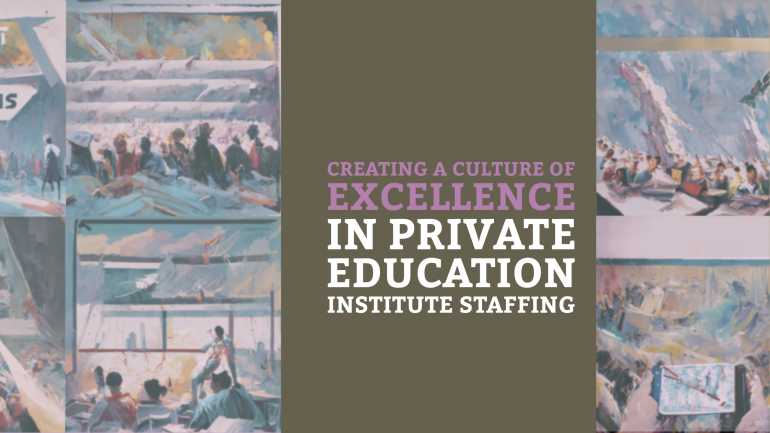Table of Contents
TL;DR: Cultivating a Culture of Excellence in Private Education
- Leadership is Key: Strong leadership sets the tone for a culture of excellence in private education institute staffing.
- Invest in Professional Development: Continuous training and development opportunities help staff members grow and excel in their roles.
- Clear Communication: Open and effective communication channels are necessary for fostering a culture of excellence among staff members.
- Recognition and Rewards: Acknowledging and rewarding staff members for their contributions motivates them to maintain high performance levels.
- Collaborative Environment: Encouraging teamwork and collaboration among staff members fosters a culture of excellence and innovation in a private education institute.
Culture plays a crucial role in shaping the environment within private education institutions. Establishing a culture of excellence among staff members is vital for ensuring optimal student outcomes and organizational success. In this blog post, we will explore the importance of building a culture of excellence within private education institute staffing, discussing key strategies and best practices for achieving this goal.
Building the Foundations of a Quality Culture
Definition and Principles of a Culture of Excellence
Clearly, the foundation of a culture of excellence in a private education institute lies in the definition and adherence to core principles. It is crucial to have a shared understanding of what constitutes excellence and the principles that guide behavior and decision-making. This includes a commitment to continuous improvement, a focus on student success, and a dedication to professional development.
The Role of Leadership in Cultivating Culture
Any private education institute aiming to develop a culture of excellence must recognize the critical role of leadership. Leaders set the tone for the organization, modeling the behaviors and values that shape the culture. They must communicate clear expectations, provide support and resources for staff, and hold individuals accountable for upholding the standards of excellence.
Culture: A strong leadership team can inspire staff to strive for excellence, fostering a collaborative environment where everyone is committed to continuous improvement and student success.
Recruitment Strategies for Excellence
Even in private education institutes, recruitment plays a vital role in fostering a culture of excellence among the staff. The process of identifying and selecting the right candidates is crucial in ensuring the institute’s success and reputation. By implementing effective recruitment strategies, private institutions can attract top talent and build a team of dedicated professionals who are committed to delivering high-quality education.
Identifying the Right Competencies and Traits
Strategies for identifying the right competencies and traits in potential candidates include conducting thorough interviews, reference checks, and skills assessments. It is important to have a clear understanding of the specific competencies and traits required for each role within the institute. This can help in selecting candidates who not only possess the necessary qualifications but also align with the institute’s values and goals.
Innovative Approaches to Hiring Educational Staff
With the constant evolution of the education sector, innovative approaches to hiring educational staff are vital for private institutions to stay ahead. This can involve utilizing social media platforms for recruitment, engaging in partnerships with educational organizations, or implementing unique screening processes to identify candidates who demonstrate exceptional teaching abilities and a passion for student success.
Understanding the importance of attracting and retaining top talent is crucial for private education institutes striving for excellence. By incorporating innovative recruitment strategies and focusing on identifying the right competencies and traits in candidates, institutions can cultivate a culture of excellence among their staff, ultimately benefiting the students and the institution as a whole.
Professional Development and Continuous Learning
Despite the challenges faced by private education institutions, it is crucial to create a culture of excellence among staff members. One of the key elements in achieving this is through professional development and continuous learning. By investing in the growth and development of educators, institutions can ensure that their staff remains up-to-date with the latest trends and best practices in the field.
Designing Effective Professional Development Programs
Professional development programs should be carefully designed to address specific needs and goals of the institution and its staff members. These programs should be tailored to meet the individual learning styles and preferences of educators, incorporating opportunities for hands-on learning, workshops, seminars, and online courses. By providing a variety of learning experiences, staff members can gain new skills and knowledge that will benefit both their professional growth and the institution as a whole.
Creating an Environment that Encourages Continuous Learning
With the rapid advancements in technology and teaching methodologies, it is crucial for private education institutions to create an environment that encourages continuous learning among staff members. This can be achieved by fostering a culture of collaboration, where educators are encouraged to share best practices, attend conferences, and participate in ongoing training programs. By supporting a community of learners, institutions can ensure that their staff remains motivated and engaged in their own professional development.
Designing a structured mentorship program can also be an effective way to promote continuous learning among staff members. Pairing experienced educators with newer staff members can provide valuable insights, guidance, and support, ultimately contributing to the overall growth and success of the institution.
Performance Management and Evaluation
Setting and Communicating Clear Expectations
For any private education institute to foster a culture of excellence among its staff, setting and communicating clear expectations is crucial. Your staff members need to know what is expected of them in terms of performance, behavior, and outcomes. This can be achieved by clearly defining job roles, responsibilities, and performance criteria at the beginning of the academic year. By setting clear expectations, you provide a roadmap for success and ensure that all staff members are aligned with the institute’s goals and values.
Constructive Feedback and Regular Performance Reviews
With constructive feedback and regular performance reviews, you can provide ongoing support and guidance to help your staff members reach their full potential. Constructive feedback should be specific, timely, and focused on behavior or actions that can be improved. Regular performance reviews should be conducted to assess progress, provide recognition for achievements, and identify areas for development. By implementing a system of regular feedback and performance reviews, you create a culture of continuous improvement and accountability within your institute.
A culture of excellence can only be achieved when staff members receive consistent feedback and are held accountable for their performance. Regular performance reviews also provide opportunities to discuss career development, training needs, and goal setting, which can lead to increased motivation and job satisfaction among staff members.
Rewards, Recognition, and Retention
Developing Incentives for Motivation and Excellence
To create a culture of excellence in a private education institute, it is crucial to develop incentives that motivate and inspire staff members to strive for excellence in their roles. With a well-designed incentive program, educators and administrative staff can be motivated to go above and beyond in their duties. This could include rewards for achieving educational goals, exceptional student outcomes, or innovative teaching methods. By tying rewards to specific performance metrics, staff members are more likely to be engaged and committed to delivering high-quality education.
Promoting Staff Retention through Recognition Programs
One effective way to promote staff retention in a private education institute is through recognition programs that acknowledge the hard work and dedication of employees. These programs can include Employee of the Month awards, recognition ceremonies, or even small tokens of appreciation for exceptional performance. By publicly recognizing the efforts of staff members, this not only boosts morale but also creates a sense of belonging and loyalty within the institute.
This sense of recognition can significantly impact staff retention rates, as employees who feel valued and appreciated are more likely to stay with the institute long-term. Recognizing and rewarding staff for their contributions creates a positive work environment where employees are motivated to excel and contribute to the institute’s overall success.
Challenges and Solutions
Managing Resistance to Cultural Change
For any private education institute aiming to foster a culture of excellence among its staff, one of the key challenges is managing resistance to cultural change. When implementing new policies, procedures, or expectations, it is natural for some staff members to resist the changes, either due to a fear of the unknown, a sense of instability, or simply because they have become comfortable with the existing way of doing things.
With this in mind, it is crucial for institute leaders to communicate effectively and consistently with their staff about the reasons behind the cultural change, the benefits it will bring, and the importance of everyone’s support in making it a success. Engaging with staff members at all levels, listening to their concerns, and providing opportunities for them to participate in the change process can help to address resistance and build buy-in for the new culture.
Sustaining a Culture of Excellence During Growth and Change
One of the challenges that private education institutes face when striving to maintain a culture of excellence is sustaining it during periods of growth and change. As institutes expand, introduce new programs, or undergo leadership transitions, there is a risk that the focus on excellence may dilute or become neglected amidst the flurry of activities.
Change is inevitable in any organization, but it is how this change is managed that will determine whether a culture of excellence thrives or falters. By setting clear expectations, providing continuous training and support for staff, and fostering a collaborative and innovative environment, private education institutes can successfully navigate periods of growth and change while sustaining their commitment to excellence.
To maintain a culture of excellence, it is vital for private education institutes to stay true to their core values and vision even as they evolve and expand. By reinforcing the importance of excellence in all aspects of their operations, these institutes can continue to inspire their staff and students to strive for the highest standards of performance and achievement.
Case Examples: Best Practices in Action
Successful Staffing Strategies from Leading Private Education Institutes
Many private education institutes have implemented successful staffing strategies to create a culture of excellence among their staff. One such example is the establishment of rigorous recruitment processes that not only focus on academic qualifications but also on soft skills and cultural fit within the organization. These institutes prioritize hiring individuals who are not only experts in their respective fields but who also demonstrate a passion for teaching and a commitment to continuous professional development.
Another best practice is the implementation of ongoing training and development programs to enhance the skills and knowledge of staff members. These institutes understand the value of investing in their employees and provide opportunities for growth and advancement within the organization. By prioritizing continuous learning and development, these institutes are able to retain top talent and ensure a high standard of teaching and services.
Adapting Best Practices for Different Institutional Contexts
One challenge that many private education institutes face is adapting best practices to suit their unique institutional contexts. With varying student demographics, academic programs, and institutional goals, a one-size-fits-all approach may not be effective. It is crucial for institutes to carefully assess their individual needs and tailor staffing strategies accordingly. By taking into account specific requirements and challenges, institutes can ensure that their staffing practices align with their objectives and contribute to overall success.
Plus, it is crucial for institutes to regularly evaluate and adapt their staffing strategies to keep up with changing trends in the education sector. By staying agile and responsive, institutes can proactively address any emerging challenges and maintain a competitive edge in the market.
Conclusion
To wrap up, creating a culture of excellence in private education institute staffing is crucial for the success and reputation of the institution. By focusing on hiring, training, and providing ongoing professional development for staff, institutes can ensure that they have a team of dedicated and skilled individuals who are committed to delivering high-quality education to students. Moreover, by promoting a culture that values teamwork, innovation, and continuous improvement, institutes can foster a positive working environment that enhances employee satisfaction and retention.
Ultimately, investing in the staff is an investment in the future of the private education institute. By prioritizing excellence in staffing, institutes can attract top talent, build a strong reputation, and most importantly, provide students with the best possible educational experience. With a culture of excellence firmly in place, private education institutes can thrive and continue to make a positive impact on the lives of their students.
FAQ
Q: What is the importance of creating a culture of excellence in a private education institute?
A: Creating a culture of excellence in a private education institute is crucial as it sets high standards for staff performance, promotes a positive work environment, enhances student satisfaction, and ultimately improves the institute’s reputation and success.
Q: How can private education institutes promote a culture of excellence among their staff?
A: Private education institutes can promote a culture of excellence among their staff by providing ongoing training and professional development opportunities, recognizing and rewarding outstanding performance, setting clear expectations and goals, and fostering open communication and collaboration.
Q: What role does leadership play in establishing a culture of excellence in a private education institute?
A: Leadership plays a critical role in establishing a culture of excellence in a private education institute by setting a positive example, communicating the institute’s values and expectations, providing support and guidance to staff, and holding everyone accountable for upholding high standards of performance and professionalism.
Q: How can staff members contribute to creating a culture of excellence in a private education institute?
A: Staff members can contribute to creating a culture of excellence in a private education institute by demonstrating a strong work ethic, being proactive in their roles, continuously seeking opportunities for improvement, collaborating with colleagues, and actively participating in institute initiatives and programs.
Q: What are the benefits of maintaining a culture of excellence in a private education institute?
A: The benefits of maintaining a culture of excellence in a private education institute include higher staff morale and motivation, improved academic outcomes for students, increased student retention and enrollment, stronger community relationships, and overall organizational growth and success.





